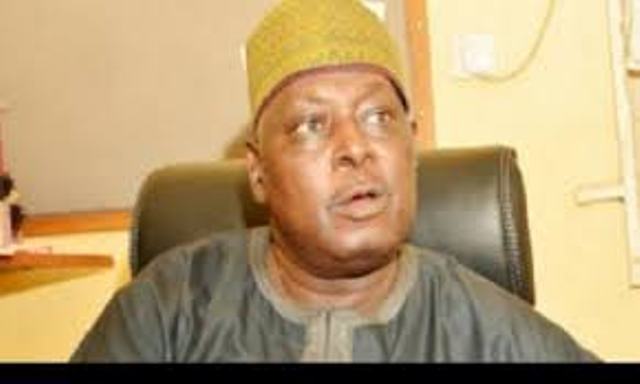The suspension of the Secretary to the Government of the Federation (SGF), David Babachir Lawal and the Director General of the Nigerian Intelligence Agency (NIA), Ayo Oke over alleged acts of corrupt practices has opened another dimension to the government’s anti-corruption agenda. Assistant Editor, CHUKWUDI NWEJE, writes
The April 19, 2017 suspension of the Secretary to the Government of the Federation (SGF), David Babachir Lawal and the Director General of the Nigerian Intelligence Agency (NIA), Ambassador Ayo Oke, over alleged acts of corrupt practices, opens a new vista in the fight
against corruption by the President Muhammadu Buhari administration.
Lawal was suspended over his role in the management of Presidential Initiative on North-east (PINE) contract awards. He was alleged to have awarded a N220 million tree-cutting contract to his company, Rholavision Engineering Limited, in contravention of public sector rules barring government officials from awarding contracts to companies in which they have interest.
Lawal’s suspension came weeks after a Senate committee indicted him over the PINE contracts and called on President Buhari to remove him from office, a request the President ignored.
The senate Ad-Hoc Committee on Mounting Humanitarian Crisis in the North-East, chaired by Senator Shehu Sani in a report submitted to the committee of the whole house on December 14, 2016, had noted that the SGF awarded grass cutting contract to ghost firms and called for his resignation, probe and prosecution for alleged mismanagement of funds meant for the North-East rehabilitation under his watch.
The committee specifically called on security and anti-graft agencies to arrest and prosecute the SGF for allegedly owning one of the companies awarded contracts in the rehabilitation of the North-East.
Lawal was alleged to have resigned his directorship of the company after becoming the SGF and after the company had executed the contract.
However, rather than sack him as the Senate demanded, President Buhari reportedly stood by him. In a letter to the Senate, Buhari noted that neither the SGF nor the company said to have been used to perpetrate the alleged illegality was invited by the Shehu Sani committee to defend themselves. He also said the report of the committee was signed by three of the nine members of the ad hoc committee, thus making its report a minority report.
Senator Sani however refuted the claims, insisting that all parties were carried along in his committee’s work. He also said that seven of nine members of the committee signed the report, not three, as claimed by the president.
Oke on the other hand was suspended over his claim that the huge sum of money recently uncovered in a Lagos apartment, belonged to NIA.
Enter Osinbajo Panel
A three-man committee headed by Vice President, Yemi Osibanjo is currently investigating “how and by whose or which authority the funds were made available to NIA, and to establish whether or not there has been a breach of the law or security procedure in obtaining custody and use of the funds.”
The panel was given 14 days to submit its report.
The action by the President, rather than attracting applause, raised questions among critics on why the administration had to wait this long before raising a panel to investigate the SGF.
The ruling All Progressives Congress (APC) came to power on the anti-corruption mantra on May 29, 2015. More than any other consideration, Buhari’s perceived image of an honest man with a zero tolerance of corruption, played great role in the APC dislodging the Peoples Democratic Party (PDP) that was in power at the time.
The APC blamed virtually everything wrong in the country on what it called “16 years of misrule by the PDP.” In its avowed determination to fight corruption to a standstill, the Buhari-led administration invested all its efforts on the war against corruption, a move lauded by his admirers but criticised by in some quarters as not being in the best interest of the country as other sectors of the country suffered.
Situating Lawal, Oke suspension
Although Lawal and Oke have stepped aside from their positions and are under probe, critics fault the manner in which their matter was approached as being in direct contrast with the measures the administration adopted against some other accused persons.
Thus, questions abound whether the APC-led government is really ready to prosecute an unbiased war against corruption or engaging in mere window dressing.
Nigerians react
Though belated, the Centre for Anti-Corruption and Open leadership (CACOL) described the suspension orders as a welcome development and a move in the right direction. Executive Chairman of the group, Debo Adeniran, described the suspension as a bold step taken by the presidency.
“For us, it ought to have been done right from when the news broke out over allegations of sharp practices in the award of contracts in the
Presidential Initiative for the North East”.
“It is the best thing the government could do to save face and to prove that it is not treating corruption with deodorant rather than using insecticide. And that is the way to go”, Adeniran argued.
Adebayo Adeolu, a public affairs analyst also supported the suspension of the SGF. “If the SGF awarded contract to himself through proxy companies, the government should investigate him. 80 % of persons in government have been doing same even in the Senate and House of
Representatives” Adeolu said. He however faulted the Osibanjo-led panel investigating Lawal and Oke, arguing that it is wrong for the
executive arm of government to raise a panel comprising members of the branch to investigate alleged acts of impropriety committed by some of its members.
PDP cries foul
PDP believes that the anti-corruption war is a ruse and a witch-hunt to harass its members and perceived enemies of the administration.
National Publicity Secretary of the party, Dayo Adeyeye, accused the APC-led government of implementing two constitutions in Nigeria; one for the PDP and other opposition parties and their leaders while the other is for the ruling party, the APC and friends of the administration.
EFCC and the anti-corruption crusade
Indeed, the EFCC has made series of arrests since the APC-led administration came to power, but a chronicle of some the arrests tends to support the accusations of one sided prosecution of the war against corruption.
Since the former National Security Adviser (NSA) to former President Goodluck Jonathan, Col. Sambo Dasuki was arrested in November 2015, over allegations of misappropriation of the $2.1bn fund meant to procure weapons to fight Boko Haram, allegations have been rife that the APC government is out to persecute members of the opposition PDP.
Prominent among close associates of the immediate past administration arrested in connection with the funds include former PDP National Publicity Secretary, Olisa Metuh, former governor of Sokoto state, Attahiru Bafarawa and founder of African Independent Television (AIT) and RayPower FM, Raymond Dokpesi. Both are political allies of former President Jonathan. Dasuki who was indicted by a panel that investigated the procurement of arms under the Jonathan administration, has been in the custody of the agency since then while Bafarawa and Dokpesi are on bail.
In early April, EFCC questioned the immediate past Governor of Niger State, Babangida Aliyu, over an alleged scam involving N5bn. Aliyu, served as governor between 2007 and 2015 on the ticket of the PDP.
EFCC has also arrested eight consultants and contractors of the Presidential Amnesty Programme over billion naira scam. The commission has also arrested Air Vice Marshal, Salihu Atawodi (retd), former chairman presidential implementation committee on marine safety over what was described as a case of conspiracy, abuse of office and misappropriation of public funds.
Atawodi allegedly abused his position as chairman of the committee to defraud the Nigerian government to the tune of over
N600m through a dubious contract to procure military boats.
Earlier in October 2015, former governor of Akwa Ibom State and incumbent Senate Minority Leader, Godswill Akpabio, was questioned by the Commission over alleged
Multi-Billion Naira fraud while he was in office.
Different strokes for different folks
For a political party which blames the 16-year rule of the PDP for all rot in the country, expectations were that the APC administration would also investigate members of the PDP who crossed over to its fold prior to the 2015 elections. This however is not the case.
For instance, former governors Babangida Aliyu and Sule Lamido of Niger and Jigawa states respectively, two of the seven PDP governors that left the party in November 2014 to form what was then called New PDP (nPDP), presently have cases of corruption hanging over their heads.
The two former governors rejoined the mainstream PDP prior to the 2015 general elections when their colleagues, Murtala
Nyako, (Adamawa); Rabiu Kwankwaso, (Kano); Aliyu Wammako, (Sokoto); Ahmed
AbdulFatah, (Kwara) and Chibuike Amaechi, (Rivers), joined the APC. These are walking free, critics observe.
Confronting the Magu challenge
Aside the allegation of double standard levelled against the government, the greatest burden facing its anti-corruption war is what is referred to in some quarters as the Magu debacle. The Acting chairman of the EFCC, Ibrahim Magu, currently faces a credibility crisis that is rubbing off on the integrity of the anti-graft war.
Buhari had in December 2016, submitted the name of the Acting EFCC chairman to the Senate for confirmation as substantive chairman of the agency. But he was rejected by the lawmakers on account of a security report which indicated that he (Magu) was not fit to be head of the Commission.
The senate requested President Buhari to present a new nominee for the post. However, rather than present a new man for the job, the President re-nominated Magu for the position in
January, 2017. The lawmakers again rejected him based on the same security report which insisted that nothing had not changed.
Despite the rejection of Magu on two occasions by the Senate, the Presidency insists on him. In fact, the current argument put forward by the government is that Magu does not need the senate confirmation to occupy the office.
Vice President insists that Magu does not need the Senate confirmation to function.
Osibanjo who spoke at the presidential villa in Abuja during an interview with journalists said
President Buhari did not find the indictment by the DSS strong enough to replace Magu.
Another senior lawyer, Femi Falana had earlier argued that although EFCC Act required the President to send the name of the chairman to the Senate for confirmation, Section 171 of the 1999 Constitution empowers the President to appoint heads of agencies like the EFCC without recourse to the Senate for confirmation.
Falana also argued that the EFCC Act is inferior to the constitution and thus the provisions of the latter should prevail.
Chairman of the Presidential Advisory Committee on Corruption (PACC) Professor Itse Sagay, shares the same view. He was, in fact, quoted as saying: “Whether they like it or not, he (Magu) will be there. His chairmanship will keep on being renewed. Since Nuhu Ribadu left, we have not had a man with such sterling qualities as Ibrahim Magu and whether they like it or not, Magu will be there until he completes his term under the law.”
Adeyeye however said that the administration’s insistence on Magu confirmed the PDP’s position on the anti-corruption war being “a ruse and a witch-hunting mechanism to harass PDP members and perceived enemies of this administration.”
- Advertisement -
- Advertisement -













